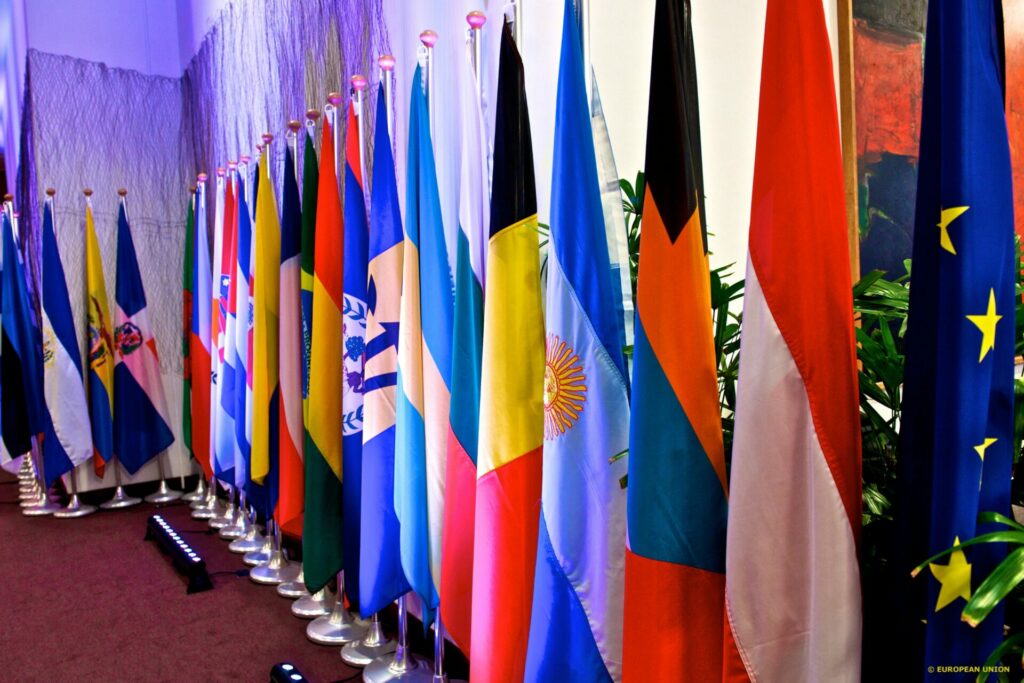According to internal EU documents leaked to Spanish newspaper El País, Brussels is fast losing its influence in Latin American countries as China and Russia make moves to align South American governments with their interests.
The continent has historically had closer political and economic ties to the West (notwithstanding notable exceptions) but this is steadily being eroded. The text, viewed by the Spanish newspaper, suggests that Brussels is preparing a diplomatic and commercial counteroffensive to recover its position in the area.
The text, originally addressed to EU foreign ministers, warns that Europe has failed to prioritise the region, specifically warning of China’s economic interest in the region and Russia’s political influence.
Physical and diplomatic distance
South America has long been neglected as an economic and political priority for Europe. The last time the two blocs held a summit was in 2015. The EU has been preoccupied by problems in its own backyard, notably Russia’s influence in eastern Europe, stemming the flow of refugees travelling from north Africa, and stabilising the Middle East and Levant.
On the other hand, China has increased its investments in the region 26-fold between 2002 and 2020, El País states. The leaked European External Action Service (EEAS) document now warns that China is “the first or second most important trading partner of Latin American and Caribbean countries, displacing the EU and surpassing the United States in many countries.”
21 of the 33 countries in Latin America have joined China's New Silk Road initiative, setting the foundations for massive Chinese economic influence in the region.
EU shortsightedness
Brussels now intends to bring the European and South American spheres closer together, with what it calls a “qualitative leap” in relations and contact. High Representative of the EU for Foreign Affairs and Security Policy, Josep Borrell, at the beginning of his mandate, made promises to strengthen the EU’s presence in the region. Yet these were overshadowed by Covid-19.
The war in Ukraine has been a wakeup call for EU foreign policy. While most Latin American countries have pledged support for Ukraine faced with Russian aggression, public support for the West’s economic sanctions, and their far-reaching economic consequences, is waning.
China and Russia are poised to exploit these economic hardships to further their influence in the region. In response, the president of the European delegation in the Euro-Latin American Parliamentary Assembly, Javi López, has advised the EU to draw up a list of fiscal measures to help overcome the economic repercussions in the region.
Corroding political support
Covid-19, the rising price of energy, and disruptions to international trade have created a fertile ground in South America for what the report calls “anti-establishment '' political candidates and sentiment. This is illustrated by the election of Pedro Castillo in Peru, Gabriel Boric in Chile, Xiomara Castro in Honduras, and other figures across the region.
“The risk of social protest and political destabilisation, which already existed before Covid, is real and has worsened with (population) displacement and the migration crisis,” the report says.
The upcoming presidential elections in Brazil will likely serve as an effective barometer for the political climate in the region, pitting Putin-friendly left-wing candidate Lula da Silva against incumbent right-wing populist Jair Bolsonaro, who has more or less remained within the western fold, though equally tainted with pro-Russian sympathies.
Shifting alliances
The report warns that the new left-wing governments of Latin America are “less focused on the Atlantic and more open to alternative alliances than the traditional ones.”
The key takeaway of the report is that Europe has remained too focused on the east, at the expense of developing areas in the west. “The EU needs to systemically boost its multilateral engagement with Latin American and Caribbean countries in view of the increased competition from China, Russia and others for votes in multilateral forums,” the report continues.
Traditionally, Latin America lent its votes to the West on United Nations resolutions, especially concerning the war in Ukraine.
Related News
- EU calls on Israel to restore a political horizon after unconditional ceasefire in Gaza war
- China-Taiwan tensions escalate over Nancy Pelosi visit
Between 2017-2021, the European Commission set aside €3.4 billion to promote trade and diplomatic relations with Latin America. The report now believes that these funds must be used more effectively, including the mobilisation of an additional €8 billion.
In the context of the European energy crisis, South America – with its huge supplies of natural resources – is growing in importance. Bolivia, Argentina, and Chile control 60% of the world's lithium reserves, used for high-capacity batteries needed for Europe's Green New Deal. Venezuela, Argentina, and Brazil have significant oil and gas reserves which will be needed to ditch Russia as the EU’s main energy supplier.
European diplomats remain hopeful for a greater rapprochement, citing the possibility of upgrading relations with the Mercosur group and trade agreements with Mexico and Chile. This will likely be facilitated by the upcoming Spanish presidency of the EU, which will start in 2023.

